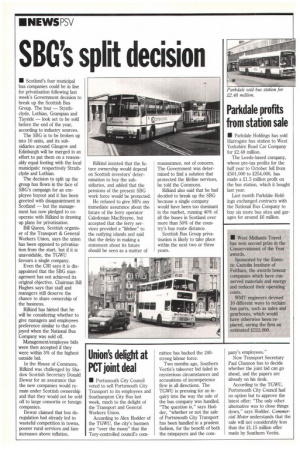SBG's split decision
Page 20

If you've noticed an error in this article please click here to report it so we can fix it.
• Scotland's four municipal bus companies could be in line for privatisation following last week's Government decision to break up the Scottish Bus Group. The four — Strathclyde, Lothian, Grampian and Tayside — look set to be sold before the end of the year, according to industry sources.
The SBG is to be broken up into 10 units, and its subsidiaries around Glasgow and Edinburgh will be merged in an effort to put them on a reasonably equal footing with the local municipals: respectively Strathclyde and Lothian.
The decision to split up the group has flown in the face of SBG's campaign for an employee buyout and it has been greeted with disappointment in Scotland — but the management has now pledged to cooperate with Rifkind in drawing up plans for privatisation_ Bill Queen, Scottish organiser of the Transport & General Workers Union, says the union has been opposed to privatisation from the start, but if it is unavoidable, the TGWU favours a single company.
Even the CBI says it is disappointed that the SBG management has not achieved its original objective. Chairman Bill Hughes says that staff and managers still deserve the chance to share ownership of the business.
Rifkind has hinted that he will be considering whether to give managers and employees preference similar to that enjoyed when the National Bus Company was sold off.
Management/employee bids were then accepted if they were within 5% of the highest outside bid.
In the House of Commons, Rifkind was challenged by Shadow Scottish Secretary Donald Dewar for an assurance that the new companies would remain under Scottish ownership and that they would not be sold off to large consortia or foreign companies.
Dewar claimed that bus deregulation had already led to wasteful competition in towns, poorer rural services and fare increases above inflation. Rifkind insisted that the future ownership would depend on Scottish investors' determination to buy the subsidiaries, and added that the pensions of the present SBG work force would be protected_ He refused to give MPs any immediate assurance about the future of the ferry operator Caledonian MacBrayne, but accepted that the ferry services provided a "lifeline" to the outlying islands and said that the delay in making a statement about its future should be seen as a matter of reassurance, not of concern. The Government was determined to find a solution that protected the lifeline services, he told the Commons.
Rifkind also said that he had decided to break up the SBG because a single company would have been too dominant in the market, running 40% of all the buses in Scotland over more than 50% of the country's bus route distance.
Scottish Bus Group privatisation is likely to take place within the next two or three years.
















































































































